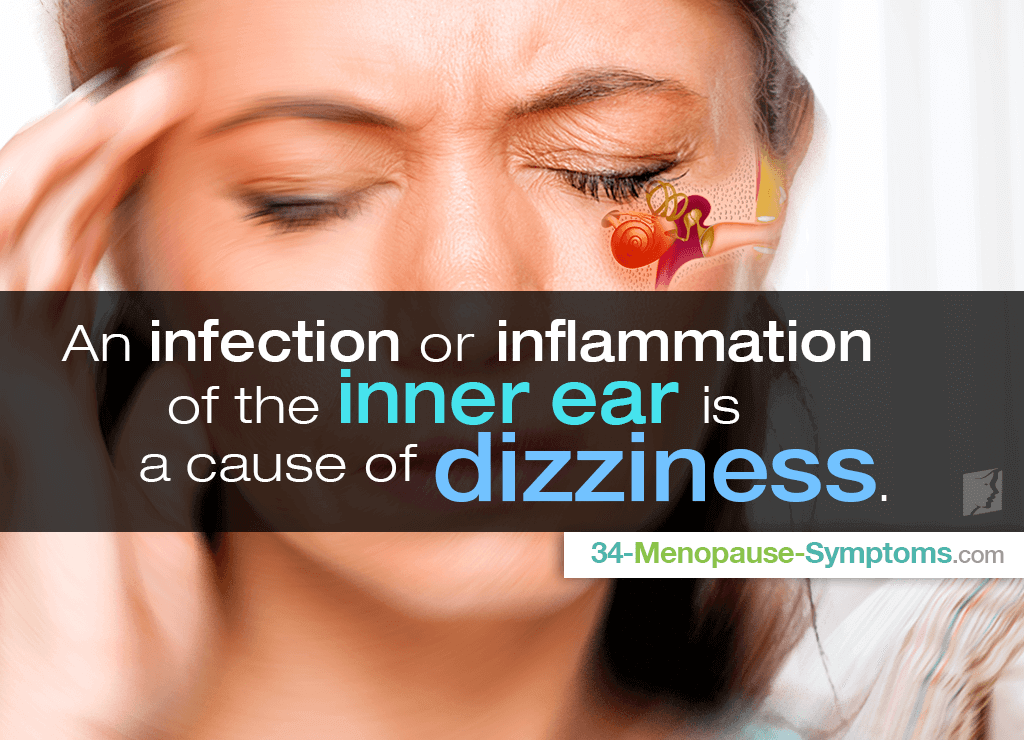Feeling dizzy is arguably one of the less obvious symptoms of menopause, as it does not physically reveal itself. Nonetheless, it is fairly common, regularly affecting a large number of women. It can be at best somewhat unsettling, but sometimes, it can be intense, which can cause concern. Unfortunately, there are several potential causes of severe dizziness, and so it can be a difficult symptom to pinpoint. Understanding some of these might be helpful when trying to come to terms with its effects.
About Dizziness
Dizziness is a broad term used to describe feeling lightheaded, weak, faint, unsteady, or sometimes nauseous. It can be disconcerting, and it may affect your day-to-day life. Usually, it is not a symptom of a life-threatening health problem; however, if you are concerned about the frequency or severity of your feeling dizzy, you should talk to your doctor about your experience.
Dizziness Causes
A wide range of conditions can cause severe dizziness, some of which might be possible to treat at home, or at least managed with certain techniques. Some of the causes that are seen most often include:
Hormonal imbalance. Fluctuating estrogen levels during menopause can cause the blood vessels to dilate and affect the nervous system, which can result in dizziness. Hormone fluctuations are the most common cause of menopausal dizziness.
Menopause symptoms. Some of the other symptoms that women experience during menopause can be so severe that they cause dizziness. Hot flashes can make you feel overheated and even like you might pass out if you don't cool down. Fatigue and insomnia can also cause lightheadedness, as sleep is crucial for maintaining normal blood pressure. These menopause symptoms can often be traced back to hormonal imbalance.
An inner ear condition. Often, the cause of feeling dizzy is rooted in an infection or inflammation of the inner ear. Ears have an impact on your balance, and when you have an infection, it can disturb your equilibrium, causing you to feel unstable and almost as if you are moving - a sensation referred to as vertigo.
Stress and anxiety. Whether this is caused by the difficulties associated with menopause or due to other factors affecting your life, feeling anxious can unfortunately lead to tiredness and sometimes severe dizziness.
Dehydration. It is suggested that each person consume between six and eight glasses of fluid per day, and more if you are in a hot environment or carrying out strenuous activity. If this is not adhered to, it is likely that you will suffer from headaches or migraines, which can lead to severe lightheadedness.
Managing Dizziness
If you have vertigo, the following tips can help prevent your symptoms from becoming worse:
Avoid bright lights, TV, and reading during dizziness episodes because they may make symptoms worse
You may need a cane or other help walking when you have a loss of balance during a vertigo attack.
Avoid sudden movements or position changes
Keep still and rest when symptoms occur
Avoid activities such as driving, operating heavy machinery, and climbing until one week after your symptoms disappear. A sudden dizzy spell during these activities can be dangerous.
If you are experiencing severe dizziness frequently, it can be distressing, especially if you are not sure of the causes. The above are some of the more common reasons known to cause this condition. Unfortunately, there could be a vast range of others. Because of this, it is important to talk to a doctor about the sensations you are encountering in order for them to explore other possible issues.
Sources
- Mayo Clinic. (2015). Dizziness. Retrieved May 5, 2017, from http://www.mayoclinic.org/diseases-conditions/dizziness/basics/definition/con-20023004
- National Health Service UK. (2015). Dizziness (lightheadedness). Retrieved May 5, 2017, from http://www.nhs.uk/conditions/dizziness/pages/introduction.aspx
- National Institutes of Health. (2015). Dizziness. Retrieved May 5, 2017, from https://medlineplus.gov/ency/article/003093.htm




